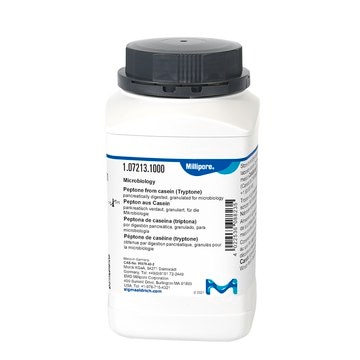95039
Tryptone enzymatic digest from casein
for biotechnological purposes
Synonym(s):
Peptone from casein, Peptone from casein, tryptic digest
About This Item
Recommended Products
biological source
bovine milk
Quality Level
grade
for biotechnological purposes
form
powder
composition
amino-nitrogen, ≥3.5%
total nitrogen (N), ≥12%
ign. residue
≤17.0%
loss
≤6.0% loss on drying
pH
6.0-7.5 (25 °C, 2% in H2O)
solubility
H2O: 2%, clear, faintly to slightly yellow
application(s)
food and beverages
microbiology
storage temp.
15-25°C
Looking for similar products? Visit Product Comparison Guide
General description
Application
- Grow recombinant strains of E. coli
- Propagate theta bacteriophages
Storage Class
11 - Combustible Solids
wgk_germany
WGK 1
flash_point_f
Not applicable
flash_point_c
Not applicable
ppe
Eyeshields, Gloves, type N95 (US)
Choose from one of the most recent versions:
Already Own This Product?
Find documentation for the products that you have recently purchased in the Document Library.
Customers Also Viewed
Articles
Culture media provides a habitat with suitable nutrients, energy sources, and certain environmental conditions for the growth of microorganisms. The components of the culture media range from simple sugars to peptones, salts, antibiotics, and complex indicators.
Our team of scientists has experience in all areas of research including Life Science, Material Science, Chemical Synthesis, Chromatography, Analytical and many others.
Contact Technical Service












